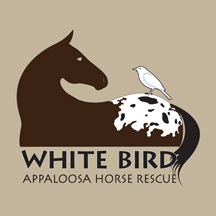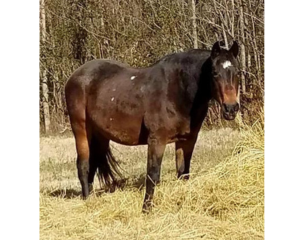Chief Joseph
Gender: Gelding
Breed: Appaloosa
|
Age: 34
Height: 15
|
Offered by White Bird Appaloosa Horse Rescue
White Bird Appaloosa Horse Rescue, 1688 Burkes Tavern Road, Burkeville, VA 23922
Photos
Click on photo to view larger image
Suitability and Training
Best career/placement option for repurposing Chief Joseph:
Pasture Mate
Close X
Chief Joseph is located at White Bird Appaloosa Horse Rescue, 1688 Burkes Tavern Road, Burkeville, VA 23922.
Total acreage dedicated specifically to the horses: 40
Our organization has use of the following at this facility:
Structures/Barns: 5 Run-in sheds: 8
Pastures: 2 Paddocks/Pens/Turnout Areas: 11
Uncovered Outdoor Rings: 1 Covered Outdoor Rings: 0
Indoor Rings: 0
Horses have assigned stalls in the structure(s) or exclusively assigned shelter locations where they are separated from other horses with a barrier.
Horses are stalled for 9-12 hours per day, on average.
The following describes the pastures at this facility:
A dedicated staff person(s) is responsible for pasture management
All pastures are fenced to prevent escape or injury
Fencing checks, such as broken or missing planks, loose fence posts, exposed or loose nails, detached wires, etc., are done regularly
Pastures have natural protection for equines (i.e., trees)
Pastures have man-made protection for equines (i.e., shelters)
The following describes the turnout areas other than pastures at this facility:
A dedicated staff person(s) is responsible for the maintenance of turnout areas
All turnout areas are fenced to prevent escape or injury
Turnout areas have man-made protection for equines (i.e., shelters)
Fencing checks, such as broken or missing planks, loose fence posts, exposed or loose nails, detached wires, etc., are done regularly
How many hours per day, on average, are horses turned out:
Equines are out 9 to 15 hours per day
Equines are out 24/7 except they are brought in if there is inclement weather
The following items are consistent with our feed management plan and practices:
Equines are provided with individualized feeding plans, including supplements, according to the equine's age, breed/type, condition, size, work level and any health issues, consisting of nutritious food provided in sufficient quantity and access to adequate natural forage, or be fed daily, or as recommended by the organization's veterinarian
Feed plans are determined in consultation with a veterinarian
Supplement plans are determined in consultation with a veterinarian
Equines are fed grain in individual stalls
Staff and/or volunteers are trained in proper feed measurements and protocols and observed periodically to ensure they are feeding correctly
The feed chart is centrally located and updated as needed
The area(s) where hay, feed, grain, and supplements are stored are kept clean, free of debris and chemicals, and protected from weather and other animals in rodent-proof and mold-proof containers and grain bins
Feed, supplements and hay types are clearly labeled
Water sources, i.e., buckets, troughs, automatic waterers, etc. are kept clean, free of contaminants, debris and chemicals, protected from weather and other animals, and be positioned or affixed to minimize spillage.
Medications are kept in a secure area
Clean, potable water is available at all times for all equines
Hoof Care: How often is hoof care provided for each horse? Every 4-8 weeks and when an issue arises
Dental Care: How often is dental care provided for each horse? Annually and when an issue arises
Horse checks: How often are horses visually and physically checked by personnel at the facility? Every day or 6 days a week
Our organization has the following parasite and fly/insect control protocols in place, including remedies used to control flies and insects:
Fly/Insect Control Remedies:
Fly Traps and Tapes
Premise Sprays/Insecticides
Fly Spray Repellent
Fly Masks
Fly Sheets
Fans
Last Updated: 2025-11-30
Close X
Rehoming
Our organization has the following re-homing (adoption/purchase) policies and procedures in place:
All potential adopters/purchasers complete a written contract which constitutes the agreement between our organization and the new owner
Our organization will only re-home an equine to a location where another equine resides
Potential adopters/purchasers must visit our organization and be observed with the equine on site
The distance of a potential adopter/purchaser's home from our facility is a consideration for when re-homing an equine
Our organization conducts a site visit of the adopter/purchaser's facility before the transfer of the equine to the adopter/purchaser's facility
Potential adopters/purchasers are encouraged to do a short-term, on-site foster with the equine
The agreement reflects that any individual or organization in possession of the equine as of the date of the agreement and any time thereafter is bound to not sell the equine at auction for slaughter or allow the equine to be sold, transferred, released, or otherwise placed into possession of any person or organization that will cause or allow the equine to be sold at auction for slaughter.
The agreement states that re-homed equines cannot be bred
The agreement states that if there is any breach of contract the equine must be returned to our organization
The agreement states that our organization reserves the right to make unannounced visits
The agreement states that our organization reserves the right to make scheduled visits
The agreement states that adopters/purchasers can return an equine to our organization free of charge
Our organization microchips all equines that are not already microchipped before the adoption and/or transfer of the equine if the organization has the authority to microchip the equine.
The agreement includes the microchip number of the equine.
Our organization requires references from the following:
Veterinarian
Farrier
Personal/Other
Transfer of ownership occurs:
Our organization retains ownership of the equine for its lifetime
The average equine re-homing (adoption/purchase) fee received by your organization:
$501 to $750
Additional information about our rehoming policies and practices:
In that the Rescue retains the right to have the horse returned for a variety of reasons, the Rescue retains co-ownership of the horse throughout the rest of its life. The rescue provides sufficient available paddock and/or stall space as an emergency facility that no returned adoption has been refused. With an aging population of senior equines we expect to maintain spare capacity by attrition, and there is no scenario where the number of returning adoptions would be too great to house.
View Re-homing Agreement
Last Updated: 2025-11-30
Close X
White Bird Appaloosa Horse Rescue
1688 Burkes Tavern Road
Burkeville VA 23922
540-272-9906
Last Updated
Public Charity
Our Mission/How we are involved with horses:
White Bird is dedicated to the rescue, rehabilitation, retraining where necessary, and the adoption of abused, neglected and at-risk Appaloosa and other equine breeds, specifically those in urgent need, in the local community, the State of Virginia, and nationally. Where horses remain unadopted, for whatever reason, they will live out the remainder of their lives in safety and dignity at the rescue.
Primary Focus involving horses
(Horse Welfare, Public Service, Sport & Recreation):
Horse Welfare
Our organization operates programs involved with horse rescue, foster care, rehabilitation, adoption and/or retirement. Our organization's primary activity is equine rescue, adoption & retirement.
Our organization is directly responsible for the care and shelter of equines involved in our programs.
Our organization provides outreach and/or public education programs involving horses.
|

EIN: 16-1650231
Founded: 2003
|
View our WEBSITE
View our PHOTO GALLERY
02-22-26
View all our available horses
here




connect
Instagram
Facebook
X